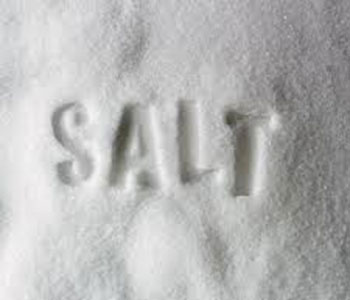Salt, also known as sodium chloride, is made up of 40 per cent sodium and 60 per cent chloride. Found predominantly in pre-prepared foods, excessive salt consumption has been linked with high blood pressure and stomach cancer, and can exacerbate osteoporosis and asthma.
The sodium component of salt is vital for controlling the amount of water in the body, maintaining the normal pH of blood, transmitting nerve signals and helping muscular contraction. Salt is present in all foods in varying degrees, and almost all processed foods contain added salt.
Sodium, unlike all other minerals, is generally over consumed, with the dietary intake of salt in the UK being far in excess of the recommended daily requirement.
Adults are advised to consume no more than 6g salt per day (about one teaspoon). Current intake is about 9g per day – that’s 50 per cent higher than is recommended for good health. Babies and children should have less salt than adults. High salt intake in babies can be especially dangerous, as their kidneys cannot cope with large amounts.
People who have experienced heart problems or have high blood pressure should follow a low-salt diet and take advice from their health care professional. Reducing sodium has been proven to be one of the best ways of lowering high blood pressure, especially in combination with broader dietary changes.
Convenience foods, ready meals and canned foods, as well as eating out frequently, all contribute to a higher sodium intake, so read labels carefully to compare foods and opt for those lower in salt. Some labels provide both the salt and the sodium content within the product. This can be confusing, as the two are not interchangeable – 1g of salt contains 0.4g sodium
If you’re checking labels, here’s a guide based on 100g/ml of product:
Ways to reduce salt intake:
Use fresh or dried herbs and spices to flavour vegetables
Avoid adding salt to your food when eating
Use soy sauce sparingly: one teaspoon contains about 0.36gof sodium (equivalent to 0.9g salt)
Buy fresh or frozen vegetables, or those canned without salt
Rinse canned foods, such as beans, to remove excess salt
Choose breakfast cereals that are lower in sodium
Buy low or reduced sodium versions, or those with no salt added
Symptoms of increased salt intake include nausea, vomiting, diarrhoea and abdominal cramps. High concentrations of sodium in the body can also result from excessive water or fluid loss. Persistently high levels of sodium in the blood can result in swelling, high blood pressure, difficulty in breathing, and heart failure, and may be fatal.
A high dietary salt intake is an important causal factor in the development of hypertension (high blood pressure), which currently affects 32 per cent of men and 30 per cent of women in the UK. Hypertension increases the risk of strain on the heart, enlarges the heart muscle, and prevents an adequate blood (and therefore oxygen) supply from reaching the heart, and may lead to heart failure, angina or heart attack.

This is rare because our dietary intake is so high, but levels of sodium in the body can become too low as a result of prolonged illness. Sodium levels can also become low due to dehydration or excessive or persistent sweating, which may occur during very hot weather or affect marathon runners, athletes in triathlons, or people with certain forms of kidney disease, such as acute kidney failure.
Symptoms of a deficiency of sodium include headache, nausea and vomiting, muscle cramps, drowsiness, fainting, fatigue and possibly coma.
More than 90 per cent of sodium occurs as salt.
More than three quarters of salt intake is derived from processed foods, just under 15 per cent from natural sources, about 10 per cent is added during cooking or when eating and 1 per cent comes from tap water.
Cereal products including breakfast cereals, bread, cakes and biscuits provide about a third of the salt in our diet. Meat and meat products provide just over a quarter of the salt in our diet.
In addition to sodium chloride, there is a wide variety of other forms of sodium in our diet, many of which are used as additives in food processing, usually to add flavour, texture or as a preservative. For example, monosodium glutamate is commonly used as a flavour enhancer.
Source: BBC
Nada Haj Khider

